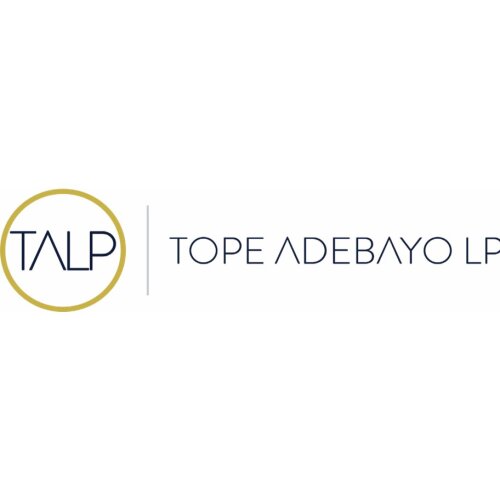Best Retirement Lawyers in Ikeja
Share your needs with us, get contacted by law firms.
Free. Takes 2 min.
List of the best lawyers in Ikeja, Nigeria
About Retirement Law in Ikeja, Nigeria
In Ikeja, the capital of Lagos State, Nigeria, retirement law mainly pertains to the rules and regulations governing the end of a working individual's career due to age or other factors. Nigerian retirement law is a combination of statutory provisions, case law, and, for public sector employees, specific civil service guidelines. The legal framework regulating retirement includes the Pension Reform Act of 2014, which outlines the establishment of pension schemes for employees to ensure financial stability post-retirement.
Why You May Need a Lawyer
Seeking legal advice is important in navigating the complexities of retirement law. Common situations where a lawyer might be necessary include disputes over pension entitlements, understanding and managing retirement benefits, challenges with compulsory retirement, issues arising from the private pension administration, and advising on the legal aspects of voluntary retirement. Also, in the event of wrongful termination disguising as retirement, a lawyer can help determine and enforce your rights.
Local Laws Overview
The key legal statutes regulating retirement in Ikeja, and Nigeria as a whole, include the Pension Reform Act (PRA) of 2014, the Nigerian Industrial Relations Act, and the Employee Compensation Act. The PRA established contributory pension schemes for both public and private sectors, ensuring that employers contribute alongside their employees towards a fund that is managed by approved Pension Fund Administrators (PFAs). There are specified rates of contribution and penalties for non-compliance. Furthermore, the Act sets retirement ages and conditions under which one can access their pension benefits.
Frequently Asked Questions
What is the legal retirement age in Ikeja, Nigeria?
The legal retirement age for most workers in Nigeria is 60 years or 35 years of service, whichever comes first. However, this can vary depending on the terms of one’s employment contract or specific industry regulations.
How do I know if I'm eligible for pension benefits?
Eligibility for pension benefits typically depends on whether you have consistently made contributions to a registered Pension Fund Administrator as stipulated by the Pension Reform Act. Your employment status and the terms of your employment contract are also factors.
When can I access my retirement benefits?
Retirement benefits can usually be accessed when you have reached the age of 60, or after 35 years of service, or upon early retirement due to medical incapacity. Some pension schemes allow partial access upon attaining 50 years of age under certain conditions.
Can an employer force an employee into early retirement?
An employer cannot unlawfully force an employee into early retirement. Early retirement should be voluntary or in accordance with the terms of an employment contract.
What legal actions can I take if I'm unfairly denied my retirement benefits?
If you believe you have been unfairly denied retirement benefits, you can take legal action against your employer or PFA, starting with mediation or arbitration, leading up to litigation if necessary. A lawyer can guide you in the correct legal procedures.
How are retirement benefits calculated?
Retirement benefits are typically calculated based on your gross salary, length of service, and the contribution rates as provided by the Pension Reform Act and the terms of your specific pension scheme.
Am I entitled to gratuity in addition to a pension?
Entitlement to gratuity depends on the terms of your employment and the provisions of the pension scheme you are enrolled in. Some schemes provide for gratuity as a lump sum upon retirement.
Can I challenge a compulsory retirement?
You may challenge a compulsory retirement if you believe it has been made on illegal or discriminatory grounds or does not comply with the terms of your employment. Legal advice should be sought in such instances.
What should I do if my employer is not making the required pension contributions?
If your employer is not making the required contributions to your pension fund, you can report them to the National Pension Commission (PENCOM) and may also seek legal assistance to enforce your rights.
Are there any tax implications for retirement benefits?
Under Nigerian law, retirement benefits received from a registered pension scheme are exempt from taxation provided that the beneficiary is 50 years old or above at the time of retirement. However, it is advisable to consult with a legal tax expert for personalized advice.
Additional Resources
For those seeking assistance with retirement legal issues in Ikeja, resources like the National Pension Commission (PENCOM), the Nigeria Social Insurance Trust Fund (NSITF), and the Pension Transitional Arrangement Directorate (PTAD) can provide guidance. Additionally, the Nigerian Bar Association (NBA) can provide referrals to lawyers specializing in retirement law.
Next Steps
If you need legal assistance with retirement matters in Ikeja, Nigeria, the next step would be to consult with a legal expert who specializes in pension and retirement law. Gathering all relevant employment documents, including your pension scheme information, will help your lawyer provide you with accurate and helpful guidance.
Lawzana helps you find the best lawyers and law firms in Ikeja through a curated and pre-screened list of qualified legal professionals. Our platform offers rankings and detailed profiles of attorneys and law firms, allowing you to compare based on practice areas, including Retirement, experience, and client feedback.
Each profile includes a description of the firm's areas of practice, client reviews, team members and partners, year of establishment, spoken languages, office locations, contact information, social media presence, and any published articles or resources. Most firms on our platform speak English and are experienced in both local and international legal matters.
Get a quote from top-rated law firms in Ikeja, Nigeria — quickly, securely, and without unnecessary hassle.
Disclaimer:
The information provided on this page is for general informational purposes only and does not constitute legal advice. While we strive to ensure the accuracy and relevance of the content, legal information may change over time, and interpretations of the law can vary. You should always consult with a qualified legal professional for advice specific to your situation.
We disclaim all liability for actions taken or not taken based on the content of this page. If you believe any information is incorrect or outdated, please contact us, and we will review and update it where appropriate.










